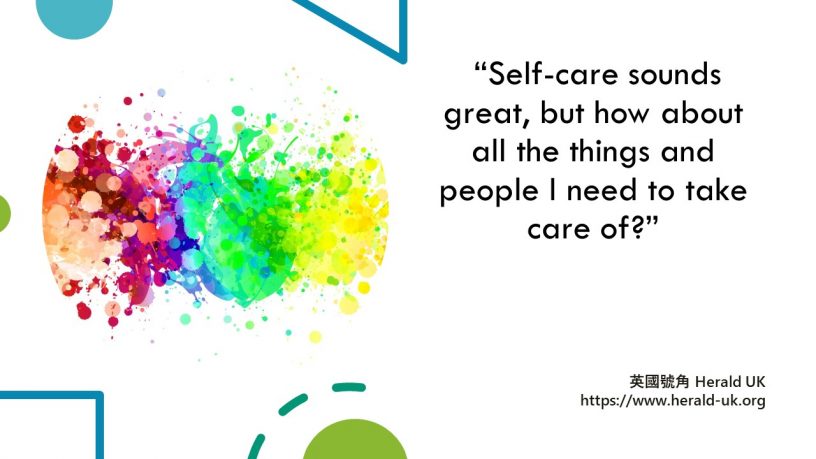Wynne C
What is the first thing that comes to mind when someone says “self-care”? I used to picture a woman sitting in a bubble bath with a moisturising face mask on, scented candles on the side and relaxing music playing in the background. Cliché, I know! My idea of self-care was highly influenced by what I watched people do on TV to wind down after a busy day. And there is nothing wrong with this particular way of self-care, as long as it works for you!
However, recently I came across an eye-opening podcast in which Taylor Elyse Morrison, the author of the book Inner Workout, defined self-care as “listening within and responding in the most loving way possible”.
It was a definition I had never heard of, and something about it made me feel uneasy at first. I’ll share with you why! I work as a GP in an inner-city practice in Manchester, and the day often goes full-speed ahead for over 10 hours from the moment I step into work. When in the day will I find time to slow down, listen within and respond? I told myself I simply did not have the luxury of time for it.
I have a mentor who has a wealth of experience from being a GP for many years. I talked to her about how busy the job was and how I found it difficult to find time for lunch at a reasonable hour most days. On certain days, I became easily frustrated by the smallest things that would not usually faze me and found myself grumpier and less efficient with every passing hour. My mentor shared how she struggled with the exact same thing in the first few years of her GP career. She eventually realised the key problem: she was “hangry” (the combination of “hunger” and “anger”, where one is angry because one is hungry). I instantly recognised this in myself! She saw what a major difference it made when she decided to commit to an undisturbed 15-minute lunch break at a fixed time, regardless of how much work she had.
My mentor was able to listen within herself to her own needs, wants and desires (she was hungry) in the midst of all the busyness and accurately identify what the most loving way was to respond at the time (she needed to prioritise lunch). This may seem like a small change, yet it is an excellent practical example of self-care! Although it could be instinctive to some, others like myself need more help in intentionally practising and forming a habit out of it.
In part two of this article in November, I will be highlighting how self-care is far from being selfish, the differences between selfishness, selflessness and selfhood, as well as the benefits of prioritising self-care in maintaining healthy, sustainable relationships with those you deeply care about.
You may be the kind of person who is reading this now and thinking, “Self-care sounds great, but how about all the things and people I need to take care of? You don’t understand how much I need to do.” If this is you, would you just pause and ask yourself this question: Am I any less important than ____ (think of a person you feel responsible for) and ____ (think of a task or job you feel is important)?
“Taking care of myself doesn’t mean ‘me first’. It means ‘me, too’.” – L. R. Knost











